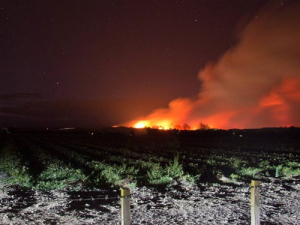Green no more?
OPINION: Your old mate has long dismissed the Greens as wooden bicycle enthusiasts with their heads in the clouds, but it looks like the ‘new Greens’ may actually be hard-nosed pragmatists when it comes to following voters.
 A Victoria University scientist says that events like the Tasman fires and Cyclone Gita are possible indications of things to come.
A Victoria University scientist says that events like the Tasman fires and Cyclone Gita are possible indications of things to come.
The Tasman fires of 2019 and 2018’s Cyclone Gita are a taste of what could be coming as our climate changes, claims a Victoria University scientist.
Judy Lawrence, senior research fellow at the Climate Change Research Institute, Victoria University of Wellington, will give this message to The New Zealand Agricultural Climate Change Conference 2019 to be held in Palmerston North on April 8-9.
Promoted as NZ’s most important agricultural conference on climate change for two years, the event will bring together scientists, government policy advisors, farmers and industry leaders to discuss the theme: ‘Meeting the challenges of climate change with respect to farming’.
Lawrence was the co-chair of the Climate Change Adaptation Technical Working group that reported to the Government in December 2017 and May 2018 on a stocktake of adaptation action and recommendations on adapting to climate change.
She says that events like the Tasman fires and Cyclone Gita are possible indications of things to come.
“Before that in 2017 the south of NZ experienced very heavy rainfall that stretched our resources. Coastal properties in low-lying roads have been flooded in Hawkes Bay, Wellington and West Coast,” she says.
“In Bay of Plenty and Coromandel, estuary margins are increasingly being flooded. These events will become more intense and, as the seas keep rising, flooding will be permanent in some areas and occur also on sunny days.”
Lawrence says such events underline the need to get organised to deal with the changing climate risk profile that confronts NZ.
On day two of the conference she will outline several possible actions to adapt to the changes.
The event organisers are NZ Agricultural Greenhouse Gas Research Centre (NZAGRC) with the Ministry for Primary Industries and the Pastoral Greenhouse Gas Research Consortium (PGgRc). Presentations will be given by NZ science, industry and policy leaders.
The programme will draw on published scientific work and research by the NZAGRC-PGgRc and by MPI’s Sustainable Land Management and Climate Change Research Programme.
Following a side-by-side rolling into a gully, Safer Farms has issued a new Safety Alert.
Coming in at a year-end total at 3088 units, a rise of around 10% over the 2806 total for 2024, the signs are that the New Zealand farm machinery industry is turning the corner after a difficult couple of years.
New Zealand's animal health industry has a new tool addressing a long-standing sustainability issue.
The Government has announced that ACC will be a sponsor of this year's FMG Young Farmer of the Year competition.
As veterinary student numbers grow to help address New Zealand's national workforce shortge, Massey University's School of Veterinary Science is inviting more veterinary practices to partner in training the next generation of vets.
South Island dairy farmers will soon be able to supply organic milk to Fonterra.